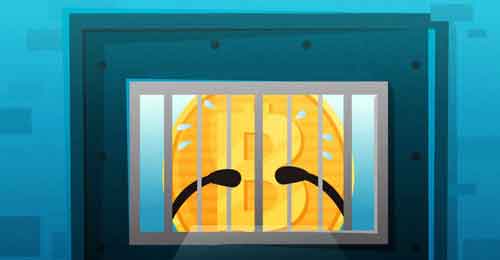Bitcoin May Be Banned or Criminalized in Upcoming Years

Bitcoin and other cryptocurrencies legal status vary from state to state, and it is still not defined and has a long way to go. While most countries do not consider Bitcoin as a legal currency, and few of them have not declared it illegal, its status as a commodity or money varies with different regulatory meanings. Few States have allowed Bitcoin to trade and use it as a payment form; others have restricted or banned it. Similarly, various departments, government agencies, and courts have categorized Bitcoins differently. In this article, we’ll analyze – what if bitcoin may be banned or criminalized in the future.
Is there any possibility that the government could ban Bitcoin in India?
The government of India does not have any strong viewpoint, and it is quite skeptical about cryptocurrencies. It is wavering between the idea of regulating cryptocurrencies or banning them. Even though the government tries to encourage blockchain technology, it does not approve its usage in cryptocurrency. If the government would like to profit from the revenue through blockchain transactions, it should approve the cryptocurrency, not just in INR, but as a unit of account.
Reasons why Bitcoin maybe Banned or Criminalized
- There have been few big changes happening over the global financial system. These changes have been geared towards efficiency and modernization, where the governments and central banks need to have greater insights and should have control of their economies.
- The year 2020 has entered into the second Great depression, which gives an idea about cryptocurrencies and Bitcoin can be banned or blocked from usage in the near future. Central Bank Digital Currency (CBDC) will be a new promising tool, and it is a closed-loop system just like other forms of digital currencies that are in the market today.
- Further, we can expect a transition, and the final goal would be to remove physical cash and move over to national digital currency. CBDC is a programmable currency that is more flexible in rules that can be built as money.
- 80% of the world’s Central banks are moving and working towards their own Central Bank digital currency.
- When gold was taken away from American citizens in 1934, the government wanted everyone in the system, specifically during challenging economic times. If the current 2020 second depression does not improve, it may lead to the 1934 American type of movement.
- Cryptocurrency offers a way out of the normal traditional system; even though Bitcoin is not created for being a threat to a nation’s monetary sovereignty, in the future, we might expect to become one.
What is Cryptocurrency, and is it different from CBDC?
- Cryptocurrency can also be called a virtual currency, and it is used as a digital asset that is created to work as a medium of exchange. It uses blockchain technology, which is decentralized spread among the computers that records and manages the transaction.
- There are around 6700 types of cryptocurrency that are traded publicly as per coinmarketcap.com (a leading market research website). Some of the popular cryptocurrencies are Bitcoin, Ethereum, Dogecoin, Ripple, etc.
- Any central bank of the nation does not issue these cryptocurrencies. This is what differentiates them from the Central Bank Digital Currency(CBDC). CBDC is the digital currency that has the same value as fiat currencies that are issued by a country’s Central Bank. People’s Bank of China is the first major bank to declare that it would experiment with Central Bank Digital Currency.
India’s Stance on Bitcoins
- This is not the first time the Indian government has shown interest in banning cryptocurrencies in India. The RBI, in April 2018, had banned cryptocurrency transactions effectively that have been carried out through e-wallets and banks. This was backed by the supreme court in the beginning; later, it quashed the circular that was issued by the central bank.
- In 2019, a similar bill was drafted, and a panel was set up that declared a 10-year prison sentence for individuals who deal or sell cryptocurrencies, that also included Bitcoin. This proposal by the government has not been brought into action.
- Beginning in February 2021, the Indian government is closer to imposing a blanket ban on trading with cryptocurrencies, mining, and Investments in India. This will include Bitcoin and other popular cryptocurrencies.
Final Thoughts
To summarise, Bitcoin is not controlled by monetary authorities, banks, financial institutions, or the government. When there is a scam committed using Bitcoin, it is very difficult to trace it because of its lack of central authority. It is not possible to recover any losses. Bitcoin’s prices are highly volatile, and several scams are committed in the name of Bitcoin. Cryptocurrency poses a great threat to the traditional banking systems that most governments have recognized. And there is no single authority that regulates cryptocurrencies. Because it is decentralized, not even a government or individuals can control it, and it will stay as long as the internet operates. That’s why the price of all cryptocurrencies, especially Bitcoin, is going high day by day. You can make investment in Bitcoin or any crypto using Immediate Edge Bot. It is an automated or programmed platform that focuses on making profit from Bitcoin. Check Immediate Edge Review by experts to get more details on this unique platform along with its legitimacy status.